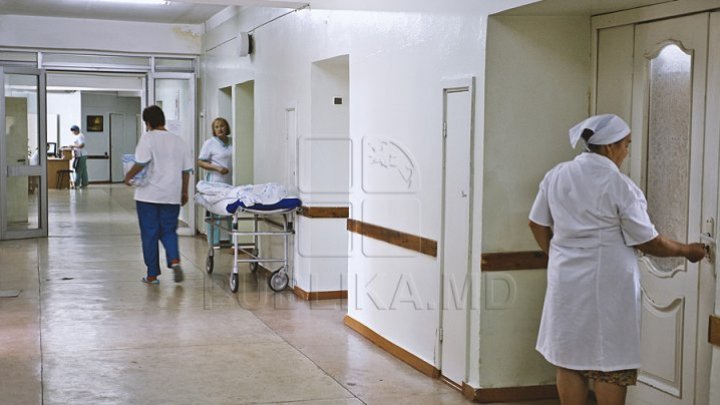Priemiere in Moldovan medicine. For the first time, our doctors carried out brain surgery
 foto: PUBLIKA.MD
foto: PUBLIKA.MD
Brain surgeries in the case of vascular-cerebral accidents have begun to be carried out in our country. The first patient is a 63-year-old woman who, due to surgery, is perfectly healthy. The surgery lasted for an hour and a half and took place at the Institute of Emergency Medicine.
- How do you feel?
- Very good.
- She says she feels good. The left hand was paralyzed a hundred percent, here she is working and doing procedures.
Eugenia Scutaru arrived at the Institute of Emergency Medicine in a grave condition. She could not move her hand, the leg and had speech disorder. All investigations confirmed the diagnosis: stroke.
"My younger girl was with me at home and she saw me, and my mother said what was wrong with you. I did not feel what it was with me. Thank you to the doctors, the team, it's a very strong team.
- After surgery, how do you feel?
"Okay, right from the first days I feel good, I'm going back and forth," said Eugenia Scutaru, a patient.
The intervention was carried out by two doctors.
"Immediately the patient was transferred to the interventional medical laboratory at the Institute of Emergency Medicine where the selective angiography was performed and the procedure was initiated. The complications were not, the clinical evolution was favorable with the restoration of the superior and inferior member", said Sorin Barat , surgeon.
"Initially, a catheter is inserted into the brain, and through the TV, the monitor shows the place where the thrombus is located to locate the angiographic system that can be guided wherever we are."
"Stroke is rapidly rising, it is predicted to be the leading cause of death and severe dementia in 2030. It is a possibility to bring the population a new quality of life, extend its duration and improve it", said Stanislav Gropa , director of the Clinic of Neorology and Neoroghirugia.
Specialists say it is important that interventions are done within the first six hours of the disease.
"It is a pathology with regret often encountered in medical practice, and it is important to promptly respond to all services to fit in this golden period in the golden hours for the patient to have a positive prognosis and the intervention to be carried out as quickly as possible ",said Boris Gâlca, State Secretary at the Ministry of Health.
Annually, there are about 12,000 people suffering from stroke in Moldova. Half of them die, and the rest remain disabled.
- How do you feel?
- Very good.
- She says she feels good. The left hand was paralyzed a hundred percent, here she is working and doing procedures.
Eugenia Scutaru arrived at the Institute of Emergency Medicine in a grave condition. She could not move her hand, the leg and had speech disorder. All investigations confirmed the diagnosis: stroke.
"My younger girl was with me at home and she saw me, and my mother said what was wrong with you. I did not feel what it was with me. Thank you to the doctors, the team, it's a very strong team.
- After surgery, how do you feel?
"Okay, right from the first days I feel good, I'm going back and forth," said Eugenia Scutaru, a patient.
The intervention was carried out by two doctors.
"Immediately the patient was transferred to the interventional medical laboratory at the Institute of Emergency Medicine where the selective angiography was performed and the procedure was initiated. The complications were not, the clinical evolution was favorable with the restoration of the superior and inferior member", said Sorin Barat , surgeon.
"Initially, a catheter is inserted into the brain, and through the TV, the monitor shows the place where the thrombus is located to locate the angiographic system that can be guided wherever we are."
"Stroke is rapidly rising, it is predicted to be the leading cause of death and severe dementia in 2030. It is a possibility to bring the population a new quality of life, extend its duration and improve it", said Stanislav Gropa , director of the Clinic of Neorology and Neoroghirugia.
Specialists say it is important that interventions are done within the first six hours of the disease.
"It is a pathology with regret often encountered in medical practice, and it is important to promptly respond to all services to fit in this golden period in the golden hours for the patient to have a positive prognosis and the intervention to be carried out as quickly as possible ",said Boris Gâlca, State Secretary at the Ministry of Health.
Annually, there are about 12,000 people suffering from stroke in Moldova. Half of them die, and the rest remain disabled.